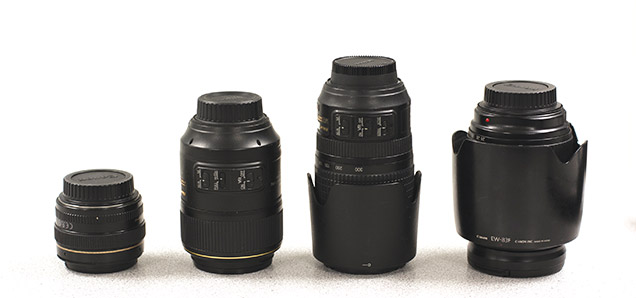Four lenses beginner photographers should have
 CREDIT: ALLISON PEARCE
CREDIT: ALLISON PEARCE(From left): General purpose zoom, macro, telephoto zoom and 50 mm prime lenses are what beginners need to kick-start their new hobby.
When it comes to photography, the type of lens you use can define the photo. For those of you who are just beginning with photography, these four lenses can help you get a beginner’s grasp on taking great photos.
1. General purpose zoom
These days, most DLSRs can be purchased with a general-purpose zoom lens. For cropped sensor cameras, an 18-55 mm lens range is great. If you own a full-frame DSLR, a 24-70 mm will work great. The beauty with these lenses is their ability to operate as both a wide-angle lens, while still giving you the focal length to zoom in on objects in the distance. These are versatile lenses that are great for shooting in a variety of situations.
2. Macro
The beauty with a macro lens is its ability to capture a great amount of detail with its ability to focus on an object up close. Macros will open you up to a world of tiny objects and help you develop as a photographer by making you look at objects differently. Macros are also great portrait lenses, since they are sharp and offer a shallow depth of field.
3. Telephoto zoom
A telephoto zoom usually has a maximum focal length to about 200-300 mm. This lens allows you to shoot objects far in the distance. This is nice when trying to shoot wildlife or sport photography. The longer focal length also allows for minimal lens distortion, which makes it a fantastic portrait lens as well.
4. 50 mm prime
The nifty 50 prime is handy because it is relatively affordable and super handy when shooting in low light. Prime lenses are usually fast – meaning the opening of the lens can be opened wide, which allows for more light onto the sensor. Many people also believe that shooting with lenses that have a fixed focal length can help strengthen your photography skills as well. You no longer rely on the zoom on your lens and instead have to walk up to your subject, making your shooting skills much more versatile.













